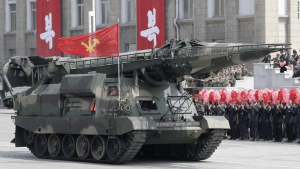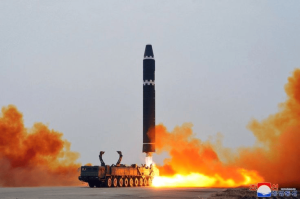North Korea Missile Launch: World War III
North Korea Missile Launch
South Korea's EOUL (AP) — According to its neighbors, North Korea launched two short-range ballistic missiles on Wednesday into its eastern seas.
The launch coincided with North Korean leader Kim Jong Un's visit to Russia for a meeting with Russian President Vladimir Putin, raising concerns around the world about a possible arms trade that may support Moscow's military actions in Ukraine.
The Joint Chiefs of Staff of South Korea reported that it had observed missiles being fired ten minutes apart from Sunan, the location of Pyongyang's international airport and that the weapons had flown cross-country in the direction of the nation's eastern seas. The distance that the guns flew was not immediately stated.
The missile has probably landed, according to Japan's Coast Guard, which cited the Defence Ministry of Tokyo. Nevertheless, the Coast Guard advised vessels near Japan's shores to be alert for any falling items. Since the beginning of 2022, Kim has launched over 100 missiles into space as part of his efforts to advance the North's armaments development, taking advantage of the international diversion created by Russia's conflict in Ukraine.
https://www.youtube.com/watch?v=2r-UO-zEuws&pp=ygUabm9ydGgga29yZWEgbWlzc2lsZSBsYXVuY2g%3D
U.S. officials believe Putin might extend his invasion of Ukraine and replenish depleting stockpiles of ammunition by using his meeting with Kim to obtain further shipments of North Korean artillery and other weapons. Experts predict that Kim would pursue his nuclear weapons and missile program in exchange for much-needed financial assistance and cutting-edge weaponry technologies. Don't forget to visit our website for interesting information urbansoutfitter.com
Historical Perspective on North Korea's Missile Launches
North Korea's missile launch program dates back to the late 1970s when it began testing short-range ballistic missiles. Over the years, the country has made significant advancements in missile technology, including the development of intercontinental ballistic missiles (ICBMs). These advancements have heightened concerns on a global scale.
Current Situation Recent Developments:
In recent months, the North Korea missile launch has conducted several missile tests, including the launch of ICBMs. These actions have triggered international alarm and condemnation.
International Reactions:
The international community, including the United Nations and major world powers, has expressed deep concern over North Korea's actions. Diplomatic efforts have been made to address the issue, but a lasting solution remains elusive.
Reasons Behind North Korea's Missile Launches
North Korea cites multiple reasons for its missile launches, including self-defense, a show of military strength, and as a bargaining chip in negotiations with other nations. Economic sanctions and isolation have also fueled the regime's desire to bolster its military capabilities.
Impact on Regional Stability
The continuous missile launches have significantly impacted regional stability in East Asia. Neighboring countries like South Korea and Japan are particularly vulnerable to North Korea's military capabilities.
North Korea's Missile Technology Advancements
North Korea's missile technology has improved over the years, raising concerns about the country's ability to reach distant targets, including the United States. The development of ICBMs is a particularly worrying advancement.
The Diplomatic Efforts
Diplomatic efforts have been made to address the issue, including negotiations and summits between North Korea and other nations. These efforts, however, have not led to a long-term resolution.
The Role of Sanctions
Sanctions imposed by the international community have aimed to pressure North Korea into denuclearization. However, these sanctions have not deterred the regime from pursuing its missile program.
Global Security Concerns
North Korea's missile launches have far-reaching global security concerns. The potential for conflict escalation, nuclear proliferation, and regional instability poses a significant threat.
[caption id="attachment_340" align="aligncenter" width="300"] Historical Perspective on North Korea's Missile Launches[/caption]
Historical Perspective on North Korea's Missile Launches[/caption]
North Korea's Missile Launch and the United Nations
The United Nations has passed numerous resolutions condemning North Korea's missile tests and imposing sanctions. These measures are intended to encourage North Korea to denuclearize and cease missile launches.
Expert Opinions
Experts in international relations and security studies offer various perspectives on North Korea's missile launches. Some believe that diplomatic negotiations are the key to resolution, while others emphasize the need for stricter sanctions.
Potential Future Scenarios
The situation regarding North Korea's missile launches remains fluid. This section will explore potential future scenarios, including the possibility of disarmament or further escalation.
The Role of Media in Shaping Perceptions
Media coverage plays a significant role in shaping how the world perceives North Korea's actions. The way events are portrayed can influence public opinion and government responses.
[caption id="attachment_341" align="aligncenter" width="300"] Role of Media in Shaping Perceptions[/caption]
Role of Media in Shaping Perceptions[/caption]
Conclusion
North Korea's missile launches are a complex and ongoing issue with far-reaching implications. The international community continues to grapple with finding a solution to this challenge.
FAQs
Why does North Korea continue to conduct missile launches despite international condemnation?
North Korea sees missile launches as a means to safeguard its regime and gain leverage in negotiations.
What is the United Nations doing to address North Korea's missile launches? The United Nations has passed resolutions and imposed sanctions, aiming to encourage North Korea to cease missile tests and denuclearize.
How have North Korea's missile technology advancements raised global security concerns?
The advancement of ICBMs increases the range of potential targets, posing a global security threat.
What role do neighboring countries like South Korea and Japan play in addressing this issue?
Neighboring countries are directly affected by North Korea's missile launches and are active participants in regional discussions and diplomacy.
Are there any peaceful solutions to the North Korea missile crisis?
Diplomacy and negotiations remain the preferred path to finding a peaceful solution, but it has proven to be challenging to achieve lasting results.
 Historical Perspective on North Korea's Missile Launches[/caption]
Historical Perspective on North Korea's Missile Launches[/caption]
 Role of Media in Shaping Perceptions[/caption]
Role of Media in Shaping Perceptions[/caption]
